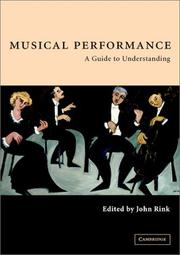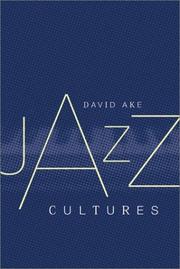| Listing 1 - 3 of 3 |
Sort by
|

ISBN: 9780521783002 0521783003 0521788625 9780511811739 9780521788625 1107129370 1282389378 9786612389375 0511643209 0511077807 0511557094 051181173X 0511202881 0511076231 9780511077807 0511074697 9780511074691 9780511076237 9780511643200 9780511557095 9780511202889 6612389370 9781107129375 9781282389373 Year: 2002 Publisher: Cambridge ; New York Cambridge University Press
Abstract | Keywords | Export | Availability | Bookmark
 Loading...
Loading...Choose an application
- Reference Manager
- EndNote
- RefWorks (Direct export to RefWorks)
This accessible guide for students, teachers and performers at all levels unravels the complexities of musical performance and focuses on key aspects of learning, playing and responding to music. A survey of performance through the ages leads to a presentation of basic historical, analytical and psychological concepts. Four chapters follow on teaching, development, practice and memorisation. The next section considers the 'translation' from score to sound, physical projection, ensemble playing and performance anxiety. The final section addresses the act of listening, the legacy of recordings, music criticism and 'performers on performance'.
Music --- Theatrical science --- Musical performance --- Performance of music --- Performance --- Musique --- Performance. --- Exécution --- Music - Performance. --- 78.50 --- 517 --- Uitvoeringspraktijk --- uitvoeringspraktijk --- muziek --- 21e eeuw --- Engeland

ISBN: 0520928326 0585466246 9780520928329 9780585466248 0520228243 9780520228245 0520232720 9780520232723 Year: 2002 Publisher: Berkeley University of California Press
Abstract | Keywords | Export | Availability | Bookmark
 Loading...
Loading...Choose an application
- Reference Manager
- EndNote
- RefWorks (Direct export to RefWorks)
Lawrence Kramer has been a pivotal figure in the development of the controversial new musicology, integrating the study of music with social and cultural issues. This accessible and eloquently written book continues and deepens the trajectory of Kramer's thinking as it boldly argues that humanistic, not just technical, meaning is a basic force in music history and an indispensable factor in how, where, and when music is heard. Kramer draws on a broad range of music and theory to show that the problem of musical meaning is not just an intellectual puzzle, but a musical phenomenon in its own right. How have romantic narratives involving Beethoven's "Moonlight" Sonata affected how we hear this famous piece, and what do they reveal about its music? How does John Coltrane's African American identity affect the way we hear him perform a relatively "white" pop standard like "My Favorite Things"? Why does music requiring great virtuosity have different cultural meanings than music that is not particularly virtuosic? Focusing on the classical repertoire from Beethoven to Shostakovich and also discussing jazz, popular music, and film and television music, Musical Meaning uncovers the historical importance of asking about meaning in the lived experience of musical works, styles, and performances. Kramer's writing, clear and full of memorable formulations, demonstrates that thinking about music can become a vital means of thinking about general questions of meaning, subjectivity, and value. In addition to providing theoretical advances and insights on particular pieces and repertoires, Musical Meaning will be provocative reading for those interested in issues of identity, gender, and cultural theory. This book includes a CD of Kramer's own composition, Revenants: 32 Variations in C Minor, which he discusses in his final chapter.
Music --- Music, Influence of. --- Subjectivity in music. --- Music, Effect of --- Hermeneutics (Music) --- Musical aesthetics --- Aesthetics --- Music theory --- Criticism --- History and criticism. --- Philosophy and aesthetics. --- Philosophy --- academic. --- accessible. --- beethoven. --- composers. --- cultural history. --- cultural issues. --- cultural theory. --- easy to understand. --- famous composer. --- gender studies. --- humanist. --- humanistic. --- identity. --- moonlight sonata. --- music culture. --- music history. --- music performance. --- musical composition. --- musical genres. --- musicology. --- scholarly. --- social history. --- social issues.

ISBN: 1282758934 9786612758935 052092696X 159734690X 9780520926967 0585465886 9780585465883 0520228871 9780520228870 0520228898 9780520228894 9781597346900 9781282758933 Year: 2002 Publisher: Berkeley University of California Press
Abstract | Keywords | Export | Availability | Bookmark
 Loading...
Loading...Choose an application
- Reference Manager
- EndNote
- RefWorks (Direct export to RefWorks)
From its beginning, jazz has presented a contradictory social world: jazz musicians have worked diligently to erase old boundaries, but they have just as resolutely constructed new ones. David Ake's vibrant and original book considers the diverse musics and related identities that jazz communities have shaped over the course of the twentieth century, exploring the many ways in which jazz musicians and audiences experience and understand themselves, their music, their communities, and the world at large. Writing as a professional pianist and composer, the author looks at evolving meanings, values, and ideals--as well as the sounds--that musicians, audiences, and critics carry to and from the various activities they call jazz. Among the compelling topics he discusses is the "visuality" of music: the relationship between performance demeanor and musical meaning. Focusing on pianists Bill Evans and Keith Jarrett, Ake investigates the ways in which musicians' postures and attitudes influence perceptions of them as profound and serious artists. In another essay, Ake examines the musical values and ideals promulgated by college jazz education programs through a consideration of saxophonist John Coltrane. He also discusses the concept of the jazz "standard" in the 1990's and the differing sense of tradition implied in recent recordings by Wynton Marsalis and Bill Frisell. Jazz Cultures shows how jazz history has not consisted simply of a smoothly evolving series of musical styles, but rather an array of individuals and communities engaging with disparate--and often times conflicting--actions, ideals, and attitudes.
Jazz. --- Jazz --- Jazz musicians. --- Accordion and piano music (Jazz) --- Clarinet and piano music (Jazz) --- Cornet and piano music (Jazz) --- Double bass and piano music (Jazz) --- Jazz duets --- Jazz ensembles --- Jazz music --- Jazz nonets --- Jazz octets --- Jazz quartets --- Jazz quintets --- Jazz septets --- Jazz sextets --- Jazz trios --- Jive (Music) --- Saxophone and piano music (Jazz) --- Vibraphone and piano music (Jazz) --- Wind instrument and piano music (Jazz) --- Xylophone and piano music (Jazz) --- African Americans --- Music --- Third stream (Music) --- Washboard band music --- Musicians --- History and criticism. --- american music. --- famous pianist. --- history of music. --- jazz communities. --- jazz composer. --- jazz education. --- jazz history. --- jazz music. --- jazz performance. --- jazz pianist. --- jazz piano. --- jazz standards. --- jazz tradition. --- john coltrane. --- music performance. --- musical community. --- musical genres. --- musical history. --- musical styles. --- musicians. --- original music. --- performance. --- pianist. --- saxophone. --- traditional.
| Listing 1 - 3 of 3 |
Sort by
|

 Search
Search Feedback
Feedback About UniCat
About UniCat  Help
Help News
News